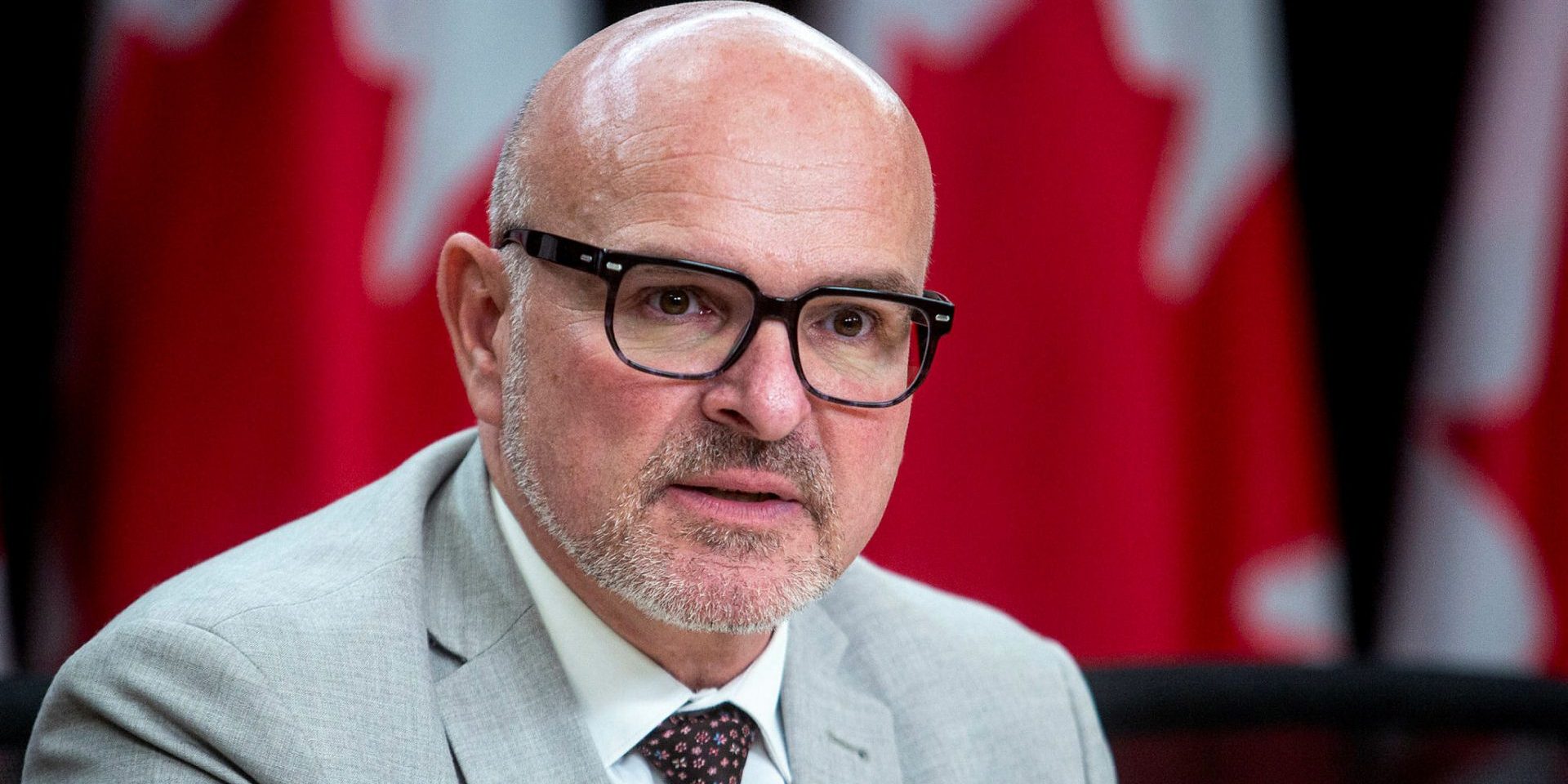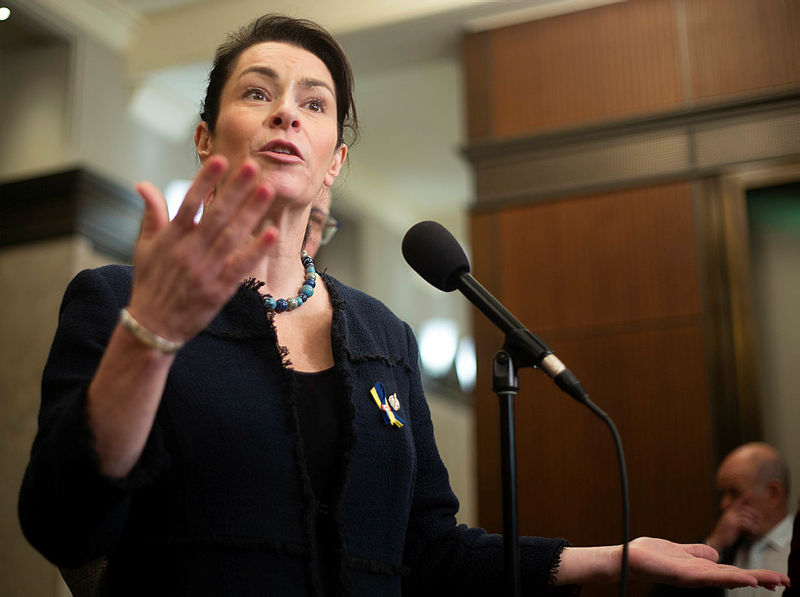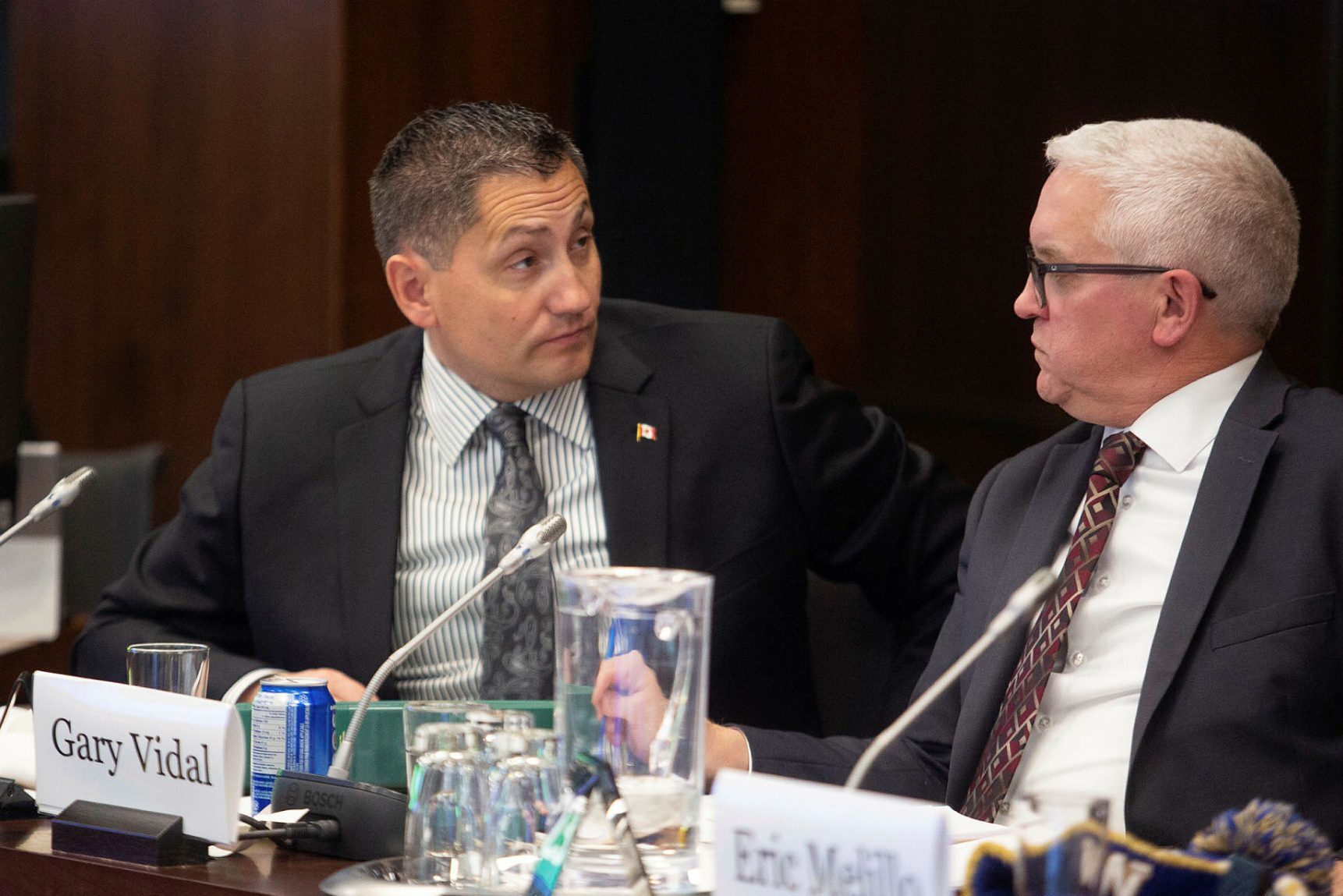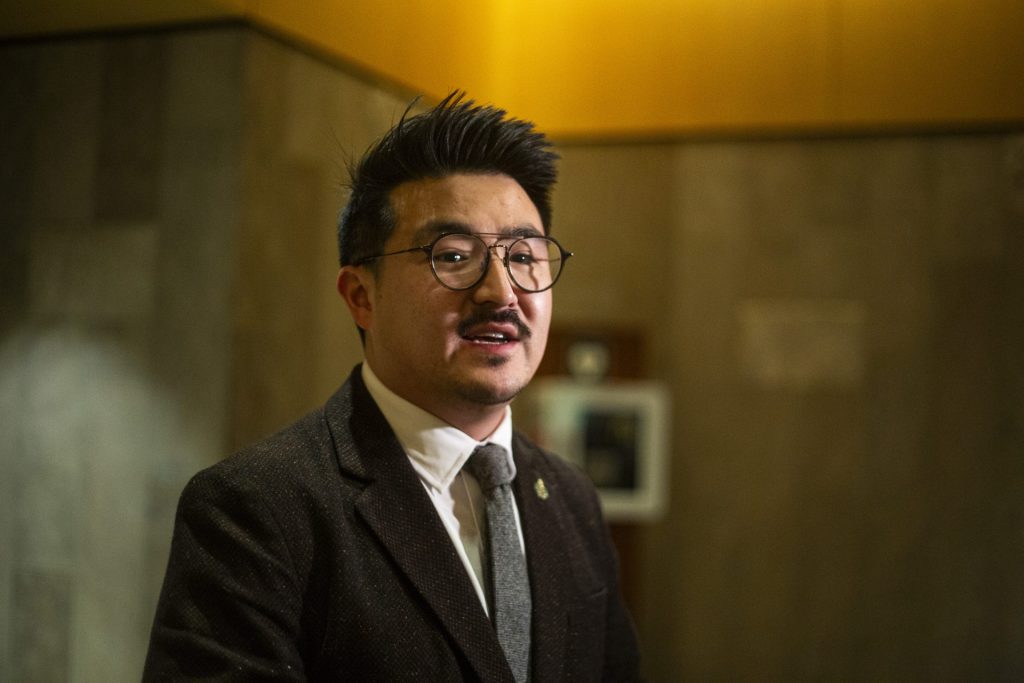Boissonnault debacle feeds into pattern of ethical lapses in government, deepens Liberal woes, say observers

Former employment minister Randy Boissonnault’s resignation has ignited a political firestorm amid allegations his former company claimed Indigenous status to secure federal contracts, sparking outrage from Indigenous advocates and opposition MPs. The debacle further damages the Liberals’ credibility at a time when they already face bleak public opinion polls, say observers.
“If I were he, and the polling were already so bad for my party, I probably would have left much sooner in an effort to not damage the party,” former Conservative staffer Yaroslav Baran told The Hill Times.
Boissonnault (Edmonton Centre, Alta.), resigned on Nov. 20, weeks after he came under fire amid National Post reports that a company he previously co-owned described itself as “wholly Indigenous-owned” in bids for government contracts under a federal set-aside program for Indigenous businesses.
The allegations, first reported by Global News, involve Boissonnault’s former business, Global Health Imports (GHI), which he co-founded with Stephen Anderson in early 2020 after losing his seat in the 2019 election.
Indigenous Services Minister Patty Hajdu (Thunder Bay-Superior North, Ont.) told MPs on Nov. 19 that “the business that Mr. Boissonnault was involved in was never on the Indigenous Business Directory” during her Nov. 19 testimony at the House Government Operations and Estimates Committee.
Liberals face political fallout
MPs across party lines voiced criticism over the past week with some Conservative MPs accusing Boissonnault of being a “fraud,” and calling the former minister an “embarrassment.”

NDP MP Heather McPherson (Edmonton Strathcona, Alta.) told The Hill Times the situation was “horrendous.”
“It’s really terrible that that’s the state of affairs,” she said. “Obviously, we’re very disappointed in the behaviour of Randy Boissonnault. The people of Edmonton Centre certainly deserve better.”
Boissonnault was the cabinet’s only representative from Alberta.
NDP MP Lori Idlout (Nunavut) said “it is a good step forward” for Boissonnault to step away from his role.
Boissonnault’s departure follows weeks of mounting criticism, as questions about his heritage and business dealings have intensified. Political observers said Boissonnault’s case damaged the Liberal government’s credibility, feeding into a pattern of recurring ethical lapses in the eyes of voters.
Stewart Prest, a lecturer in political science at the University of British Columbia, argued that there were already issues with mismanaged programs, and MPs or cabinet ministers making inappropriate decisions. While not all of these decisions justify further scrutiny or warrant criminal investigations, they reflect poor judgment in hindsight, said Prest.
“It’s just the pattern of lapses in judgment requiring some kind of apology and/or change, or some kind of resignation, and this stems from the prime minister on down,” Prest said.
Given this, he said the allegations against Boissonnault may not create additional problems for the government, but only because voters concerned about these issues may have already moved their support elsewhere.
Prest suggested that Boissonnault’s resignation could allow the government to create a clear separation between the Alberta MP and the cabinet as allegations continue to unfold. He noted this development would have little impact on the Liberals’ standing in Boissonnault’s Alberta riding because “their fortunes couldn’t sink much lower in that province already.”
Instead of “renewing support among Albertans and other Canadians,” said Prest, the Liberals are once again, “playing defence and trying to excuse the alleged actions of a member of cabinet.” This comes at a time when the party needs to be “building the case to Albertans why they are able to represent their interests in a future election,” he said.

Baran argued that what began as an “unfortunate story about conflict of interest” has “grown into a potentially bigger, uglier story, about business conflict of interest, and false Indigenous identity, and potentially cocaine smuggling.”
National Post reported last week that GHI shared a post office box with a woman involved in arrests in two major drug busts.
Baran echoed that Boissonnault stepping down was “an attempt to disassociate the Trudeau brand” from the allegations.
With Liberal popularity sinking in the polls, he said “several things ago would have been, the last thing [the Liberals] needed.”
Baran suggested that Conservatives are likely to double down on their messaging, by saying “this government is so corrupt that it doesn’t even see obvious conflicts of interest when they’re staring them in the face.”
Baran said there has been a series of conflict-of-interest cases during the Liberals’ time in government, and the voters “could be forgiven for concluding that the government has not learned its lesson at any step of the way.”
According to a recent Abacus Data poll, the Conservatives are ahead by 22 points, with 43 per cent voter support across the country, positioning them to comfortably form a majority government. The Liberals and New Democrats are tied for second place, each sitting at 21 per cent. In Alberta, the same poll shows Conservatives have a commanding lead with 60 per cent support, while the Liberals sit at just 13 per cent.
What’s next for Boissonnault?
Alice Hansen, a spokesperson for Boissonnault, did not respond to The Hill Times’ questions about the steps the former minister plans to take to address allegations of “pretendianism” or to verify his Indigenous identity.

Boissonnault has been the subject of two House Ethics Committee probes, but a third is in the works with the House Indigenous and Northern Affairs Committee unanimously passing a new motion put forward by Conservative MP Jamie Schmale (Haliburton-Kawartha Lakes-Brock, Ont.) calling for Boissonnault to testify before Dec. 6.
The House Ethics Committee has been investigating Boissonnault’s business dealings amid media reports alleging he remained actively involved in Global Health Imports, a company he co-founded in May 2020 after his re-election in 2021. Boissonnault, first elected in 2015, lost his seat in 2019 but returned to office in 2021. He reportedly resigned from GHI after that but remained a 50-per cent shareholder in the company until June, when he surrendered his stake.
GHI reportedly bid for two contracts claiming Indigenous status, but was unsuccessful in securing them. Boissonnault said he “never put Indigenous claim to any contract or application in my entire life” when he responded to the allegations speaking in Edmonton. “I never clicked any box in any form with the Liberal Party,” he said.
The only federal contract awarded to the GHI, according to government records, is a competitive one valued at $28,298 to supply disposable gloves to Elections Canada. The contract which is not specified to have any funds through Indigenous procurement programs—began on Jan. 5 of this year and runs until Dec. 30, 2024. There has been no indication from the federal government that this contract has ended or that the company has been suspended.
The controversy began when text messages obtained by Global News referred to a “Randy” discussing details of a $500,000 federal contract with partners at Global Health Imports. Cabinet ministers are prohibited from holding government positions while bidding on federal contracts through private companies as it creates an ethical breach. For months, Boissonnault and his former partner claimed the “Randy” mentioned in the messages was an “other Randy,” though neither identified this person. It was later revealed that Global Health Imports had identified itself as an “Aboriginal owned” company in government bids, a revelation that has further fueled scrutiny.
Global News reported that Edmonton police are investigating an allegation of fraud made against Boissonnault’s former company and business partner Stephen Anderson. A previous Global News investigation found the company was embroiled in lawsuits and Boissonnault was listed as a director for GHI in business registries while it competed for provincial and municipal contracts, over a year after Boissonnault return to politics. According to Global News, GHI has lost at least five lawsuits and has been ordered to pay more than $7.8-million to its suppliers and buyers but Boissonnault is not named in any of the lawsuits. Text messages obtained by the network also raised questions about Boissonnault’s involvement in GHI’s business deals, but the former minister denies being the person mentioned.
There is ‘a lot of outrage’ in the community, says Indigenous advocate
NDP MP Blake Desjarlais (Edmonton-Griesbach, Alta.) told The Hill Times that he was “disturbed by the fact that it took this long” for Boissonnault—whom Desjarlais called a “raceshifter”— to step down.

Desjarlais said there have been questions around Boissonnault’s Indigenous identity within the Edmonton Indigenous community since a photo of him and other members of the Liberal Party’s Indigenous caucus was first published in 2015. “Many Indigenous People who were concerned about that asked about that claim, and had a very difficult time trying to ascertain who he really is. This has become something that Indigenous people have silently suffered,” Desjarlais said.
Desjairlais questioned why the Liberals allowed Boissonnault to be a part of their Indigenous caucus before confirming his heritage. “Why did the Liberals do this? Was it to gain a perception that their Indigenous caucus was larger than it actually is,” he asked.
“We finally got to the point where we were able to ascertain exactly what [Boissonnault] doesn’t know. He should take the opportunity to deeply reflect on who he is. … He should have done that work prior to applying for government contracts,” said Desjairlais.
Shannin Metatawabin, CEO of the National Aboriginal Capital Corporations Association, said he hears “a lot of outrage” from the Indigenous community, particularly those involved in the procurement space. Metatawabin said “it took too long [for the government] to remove [Boissonnault] after the allegations.”
“I was waiting for days,” he said.
Metatawabin is Cree/Inninow from Fort Albany First Nation of the Mushkegowuk Nation. He is also part of the newly formed First Nations Procurement Organization (FNPO), an organization helping businesses to overcome barriers to federal procurement and tracking the government’s progress on its five per cent Indigenous procurement target.
Metatawabin said the new developments highlight how “the procurement ecosystem, the government, public service, is ripe for people that claim indigeneity to seek benefits, and this goes right to the top to the cabinet.”
“We have to take some extreme measures to make sure that there’s penalties in place that ensure people don’t continue to do this type of thing,” he said. “We have to stop it right now.”
Boissonnault’s Indigenous ties under scrutiny
Boissonnault has apologized for the ambiguous presentation around his Indigenous identity prior to leaving the cabinet.
“I apologize that I wasn’t as clear as I could have been about who I am and my family’s history,” he said, speaking in Edmonton on Nov. 15. “I apologize if that particular way of referring to myself—I apologize that it was inaccurate,” he said, adding he never claimed Indigenous status. He noted he’ll confirm his great-grandmother’s status, but his adoptive mother and brother are citizens of the Métis Nation of Alberta.
While Boissonnault never outright declared himself Indigenous, at least not publicly, the multiple references to his ties to the Indigenous heritage in the House and in parliamentary committees over the years leaves room for confusion around his history.
Records show Boissonnault referring to himself as a “non-status adopted Cree from Alberta,” and mentioned his great-grandmother as a “full-blooded Cree woman” multiple times in his interventions in the House, dating back to 2016. In some of those interventions he uses the Cree saying “miyotôtâkewin tatawaw,” more than once, which means, “Guests, you are welcome. There is room here.”
A 2017 Canadian Press story noted that Boissonnault identifies as “non-status adoptive Cree, a heritage traced back to a maternal great-grandmother in the family that adopted him.”
Desjarlais said this description “isn’t even anywhere close to a real identity,” adding that, “in Canada, there isn’t even such a thing as status Métis, let alone non-status Métis. So, we see this as a red flag in pretendianism.” Metatawabin, who is Cree himself, called that description “confusing.”
“One thing that an Indigenous person will do is clarify exactly who they are, who they belong to, and who claims them, prior to announcing to the world and starting to receive benefits that they’re Indigenous,” Metatawabin said.
However, Liberal MP Jaime Battiste (Sydney–Victoria, N.S.), who is Mi’kmaq and chairs the Liberals Indigenous caucus, told The Hill Times that Boissonnault’s involvement with the group “was only as an ally.”
“At no point has Randy ever indicated to me that he was Indigenous,” Battiste said. He added that he supports Boissonnault’s decision to step down, which Prime Minister Justin Trudeau (Papineau, Que.) said was “to focus on clearing these allegations.”
Minister of Northern Affairs Dan Vandal (Saint Boniface-Saint Vital, Man.), who is Métis, told The Hill Times in an email that he “totally support[s] and understand[s] Randy’s decision to resign” and added that Boissonnault has been “a great ally to the Indigenous caucus for many years.”
A correction was issued in a 2019 CBC News article about Indigenous candidates running in the federal election in which Randy Boissonnault was incorrectly identified as Indigenous. “The Liberal Party sent a clarification to say Boissonnault’s mother is Cree, but he was adopted and does not claim Indigenous heritage. The party says the information came from a staff error in the process of responding to CBC’s inquiry into Indigenous candidates,” read the network’s correction.
—with files from Sophall Duch
ikoca@hilltimes.com
The Hill Times






 LICENSING
LICENSING PODCAST
PODCAST ALERTS
ALERTS













